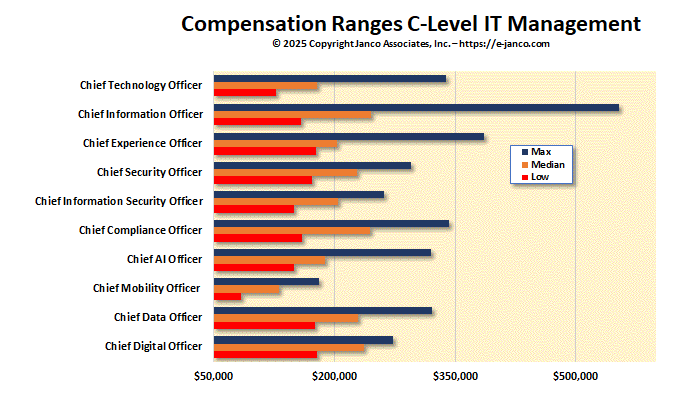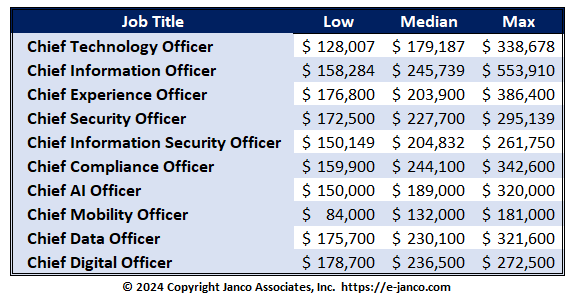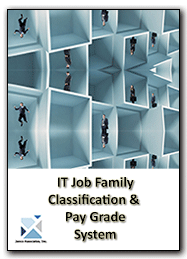Highest salaries for IT Pros are at the C-Level
Inflation driving up salaries for IT Pros – Attrition rates are rising driven by desire for salary increases
 With the onset of the pandemic and the move towards virtual operations, the landscape of senior (C-Level) technology-based positions have changed in many corporations. Where there used to be a single position, Chief Information Officer (CIO) who was the “center post” for technology there are now over a half dozen positions that are driving and managing technology within corporations.
With the onset of the pandemic and the move towards virtual operations, the landscape of senior (C-Level) technology-based positions have changed in many corporations. Where there used to be a single position, Chief Information Officer (CIO) who was the “center post” for technology there are now over a half dozen positions that are driving and managing technology within corporations.
There once was a CIO - Chief Information Officer that ruled overall technology. That now changed to well over nine (9) positions that have assumed responsibilities for different legs of technology. What are the different responsibilities for these new positions and how much are these individuals paid?
Compensation for C-Levels with Information Technology
Almost all are paid a minimum of $100K and some are paid well over $400K.
C-Level Job Description Bundle |
Order |
The C-Level job description bundle contains the top twelve (12) IT job descriptions. Each is between 5 to 8 pages long and is at the level of detail that KPI performance metrics can be defined and related directly to both employment contracts and compensation/bonus levels. Also included is a summary of the compensation for these positions.
- Chief Information Officer(CIO)
- Chief Information Officer (CIO) - Small Enterprise
- Chief Artificial Intelligence Officer (CAIO)
- Chief Experience Officer (CXO)
- Chief Security Officer (CSO)
- Chief Information Security Officer (CISO)
- Chief Compliance Officer (CCO)
- Chief Mobility Officer
- Chief Technology Officer (CTO)
- Chief Product Officer
- Chief Data Officer (CDaO)
- Chief Digital Officer (CDO)
The positions and brief definition of purposes are:
-
Chief Information Officer - accountable for directing the information and data integrity of the enterprise and its groups and for all Information Technology functions of the enterprise. This includes all data centers, technical service centers, production scheduling functions, help desks, communication networks (voice and data), computer program development, mobile device interactions, and computer systems operations. He or she is responsible for maintaining the integrity of all electronic and optical books and records of the enterprise.
-
Chief Technology Officer - aligns technology vision with business strategy by integrating company processes with the appropriate technologies. The Chief Technology Officer is also responsible for all aspects of developing and implementing technology initiatives within the organization. This individual maintains existing enterprise systems while providing direction in all technology-related issues in support of information operations and core company values.
-
Chief Compliance Officer - oversees and reviews all legal technology issues across the organization. This includes providing objective assessments of the company’s compliance with legislation governing the organization’s information technology systems and industry-specific regulations. The Corporate Compliance Officer also directs the development and implementation of policies and procedures to ensure that the organization’s practices remain observant to all pertinent local, state/province/county, and federal laws.
-
Chief Digital Officer - helps a company drive growth by converting traditional "analog" businesses to digital ones and oversees operations in the rapidly changing digital sectors like mobile applications, social media, and related applications, virtual goods, as well as web-based information management and marketing.
-
Chief Data Officer - is not only a data expert but also a seasoned operational manager. As the role is transformational, the CDO is responsible for the adoption of data technologies across the entire business. As with most senior executive titles, the responsibilities are set by the organization's board of directors or other authority, depending on the organization's legal structure. The CDO is responsible for data consumer experiences across the entire enterprise and its operations.
-
Chief Security Officer - responsible for the overall direction of all security functions associated with Information Technology applications, communications (voice and data), and computing services within the enterprise. At the same time, the CSO must be aware of the implications of legislated requirements that impact security for the enterprise.
-
Chief Experience Officer - responsible for the overall experience of customers, suppliers, partners, associates, and internal staff to an organization’s products and services. The individual drives the enterprise’s growth in the user experience arena. They oversee operations in all user experience sectors like marketing, image setting, mobile applications, social media, and related technologies, virtual goods, as well as web-based management and marketing.
-
Chief Mobility Officer - responsible for the overall direction of all mobility issues associated with Information Technology applications, communications (voice and data), and computing services within the enterprise. At the same time, the CMO must be aware of the implications of IT and industry mobility trends.
-
Digital Brand Manager - is responsible for digital consumer experiences across the entire enterprise and its operations. The Digital Brand Manager helps a company drive growth in its brands and product lines by converting traditional physical brand management processes to social media ones and oversees the rapidly changing digital sectors like mobile applications, social media, and internet-based marketing.
Each of these roles has a unique focus. Janco has created a job description for each of them. They have been grouped together in a single job description bundle.
Order C-Level Job Descriptions





